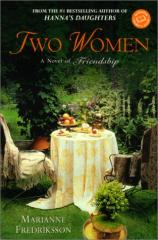Reading Group Guide
Discussion Questions
Two Women

1. Initially, both women made assumptions about one another. In the end, how accurate do you think these assumptions were?
2. This book deals with a friendship between two women--sometimes it is rocky and difficult, other times it is as comfortable as a favorite worn-in tee shirt. What makes the bond between two women so special? What are some differences between male and female friendships?
3. Mira speaks of the seven devils we all must confront before we can meet our guardian angel. In the beginning of this book neither woman has confronted her devils. By the end, do you think they have?
4. Neither Inge nor Mira had a warm relationship with their parents. Both their fathers abandoned them--either physically, mentally or both--and their mothers were cold and distant. Do you think this has affected their own relationships with their children? Has it made them better parents, or simply different ones?
5. There are many reasons why Inge and Mira choose not to remember past events: shame, guilt, anger, despair. In each of their individual situations, what do you think their major motivator is?
6. A predominant theme in the book is division between class and race. Are we all guilty, to some degree, of prejudice?
7. Chilean women suffered horrible atrocities under Pinochet, but they were also held back and kept silent by other important males in their lives--fathers, lovers, and husbands in a male dominated society. Mira states that she didn't become human before she moved to Switzerland and divorced her husband. In contrast, Inge is born into the more egalitarian Swedish society, yet she also struggles to find her voice. What are the differences and likenesses of the two women's search for their independence and sense of self?
8. Mira states, "Without anger, despair can get you." Obviously, she uses her anger as a defense mechanism. What are some of Inge's defense mechanisms? What are some of your own?
9. Discuss the two generations in this book. What are some of the differences between Inge, Mira, Matilede's generation, and their children's?
10. Inge cannot understand Mira forgiving her mother, who treated her so poorly, yet didn't she essentially forgive Jan for treating her just as badly? Is there a difference in these two situations?
11. Jose convinces Nano to find the truth about his past and where he came from. Do you think what Nano found in Chile helped him in the end?
12. The question is raised--is there such a thing as the one great love? What is your opinion?
13. Both women must grieve their losses in this novel, and they often chose to do it by cutting themselves off from the rest of the world. Do you think this is common of women and the grieving process?
14. This novel concludes on a somber note: "The silence hung heavily, both in the little terraced house and in the cars that rolled homewards through the darkness." Are you satisfied with this ending? If not, explain why.
15. Which character did you relate to most in this book and why?
16. Inge and Mira seem to find pieces missing in themselves in each other. Do you believe we seek out in others the pieces that we are missing in ourselves?
17. If you had the opportunity to sit and talk with Marianne Fredriksson, what questions would you ask her?
Two Women
- Publication Date: May 28, 2002
- Paperback: 224 pages
- Publisher: Ballantine Books
- ISBN-10: 034544017X
- ISBN-13: 9780345440174






